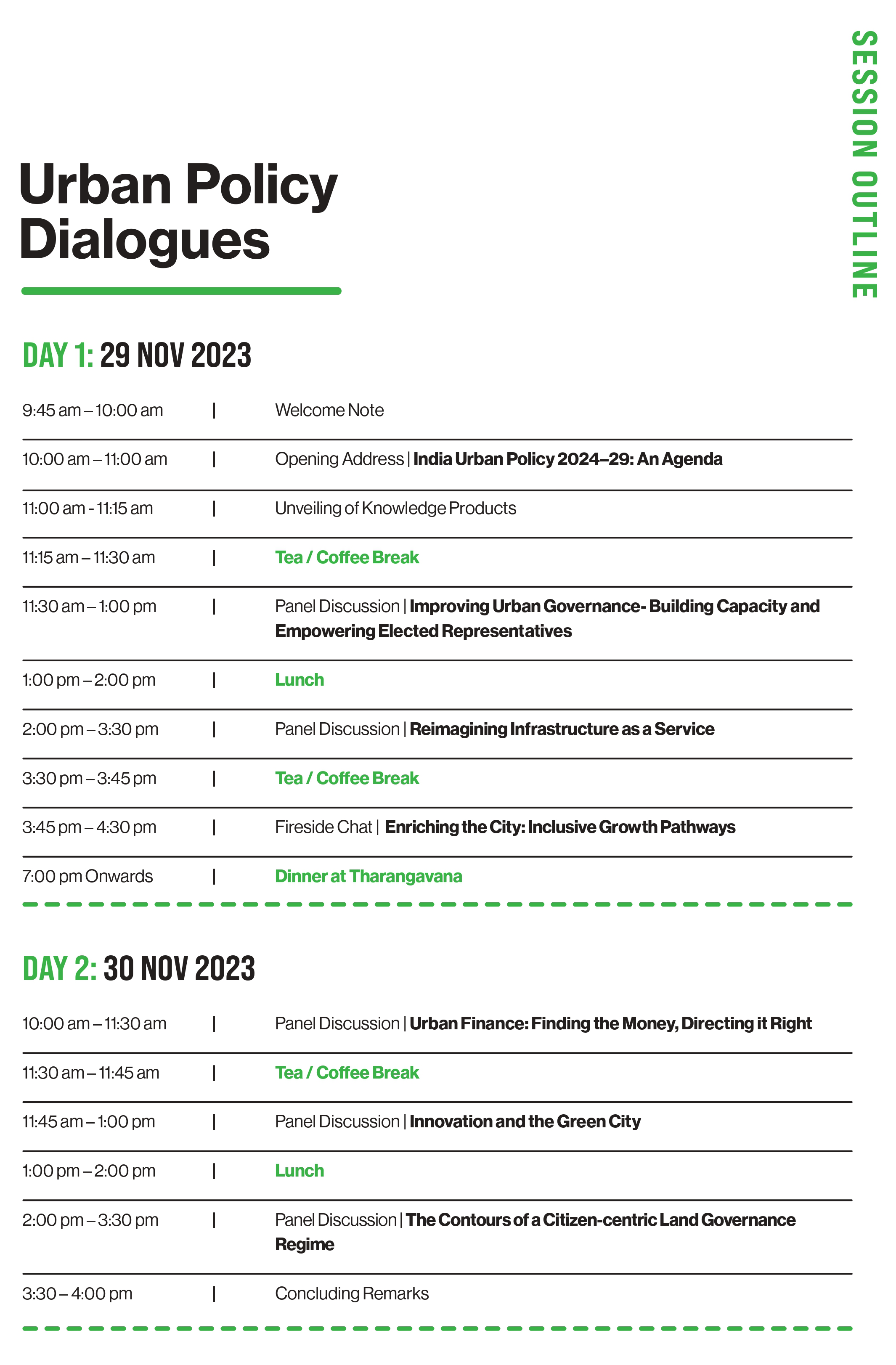UPD 2023
Urban India: Policy Cornerstones for the Next Leap
Discussions during the 9th edition of UPD centred on Urban India: Policy Cornerstones for the Next Leap. The focus was on six themes that are set to determine the future course of Indian cities: economic growth and development policy; deepening governance and administrative reforms; public and municipal finance; improved land management; re-imagining infrastructure as service; and, promoting green innovation.

Summary Of Discussions
An annual flagship event of the Indian Institute for Human Settlements (IIHS), the UPD brings together select participants from diverse spheres of action to reflect on a bolder, more sustainable, and more equitable urban transformation agenda for India. The first edition of the UPD was held in 2014, as the second generation of the country’s flagship urban policies were being formulated.
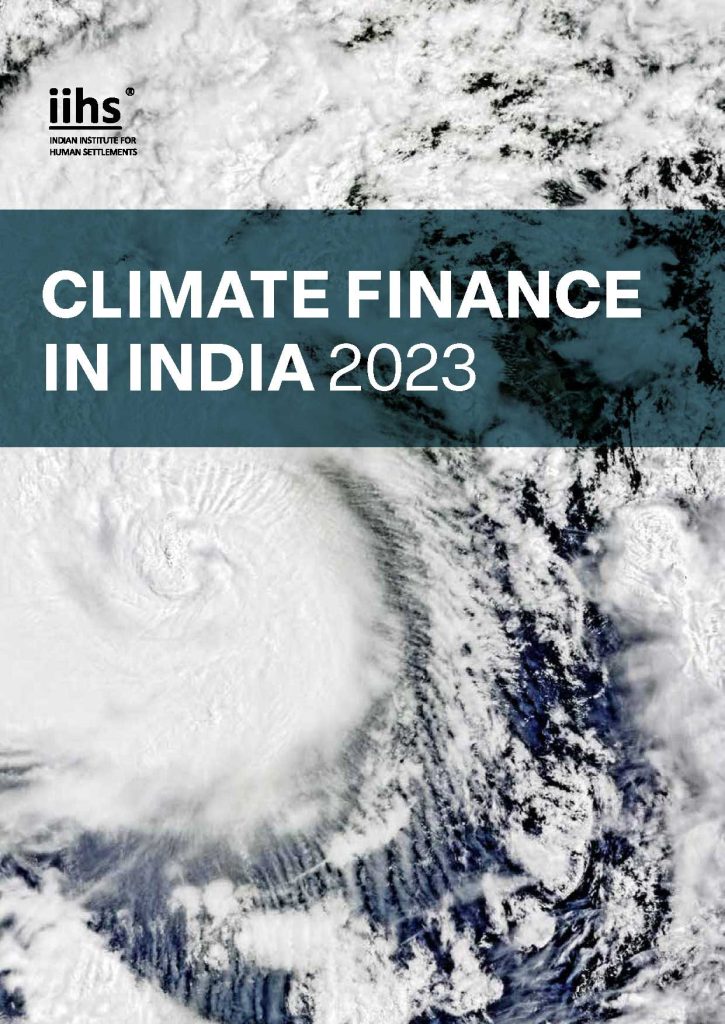
Climate Finance in India 2023
This report takes stock of the current climate finance landscape in India, along with the estimated financing requirements, enabling conditions and macro policy instruments to achieve national 1.5oC and 2oC goals. While the negative impact of climate change on India’s economy is projected by scholars at around 3 to 10 percent of annual Gross Domestic Product (GDP), meeting the global 1.5°C target will require investments of 7 to 18 per cent of country’s GDP.
 Indian Municipal Finance 2023
Indian Municipal Finance 2023
This study examines decadal time-series data from 33 Urban Local Bodies (ULBs) of varying sizes across India. The findings reveal persistent challenges around intergovernmental transfers, revenue mobilisation and O&M (operations and maintenance) expenditure, while identifying opportunities to address some of these concerns.
 The Urban in India’s Recent State Budgets
The Urban in India’s Recent State Budgets
This study explores the pivotal role of Indian state governments in shaping urban development. Examining five diverse states—Kerala, Madhya Pradesh, Odisha, Rajasthan, and Tamil Nadu—during the 2021-22 to 2023-24 period, the research reveals a recent surge in attention and financial commitment to urban development. This study provides valuable insights into the nuanced strategies of state governments, the variations among them, and the role of centrally sponsored schemes.
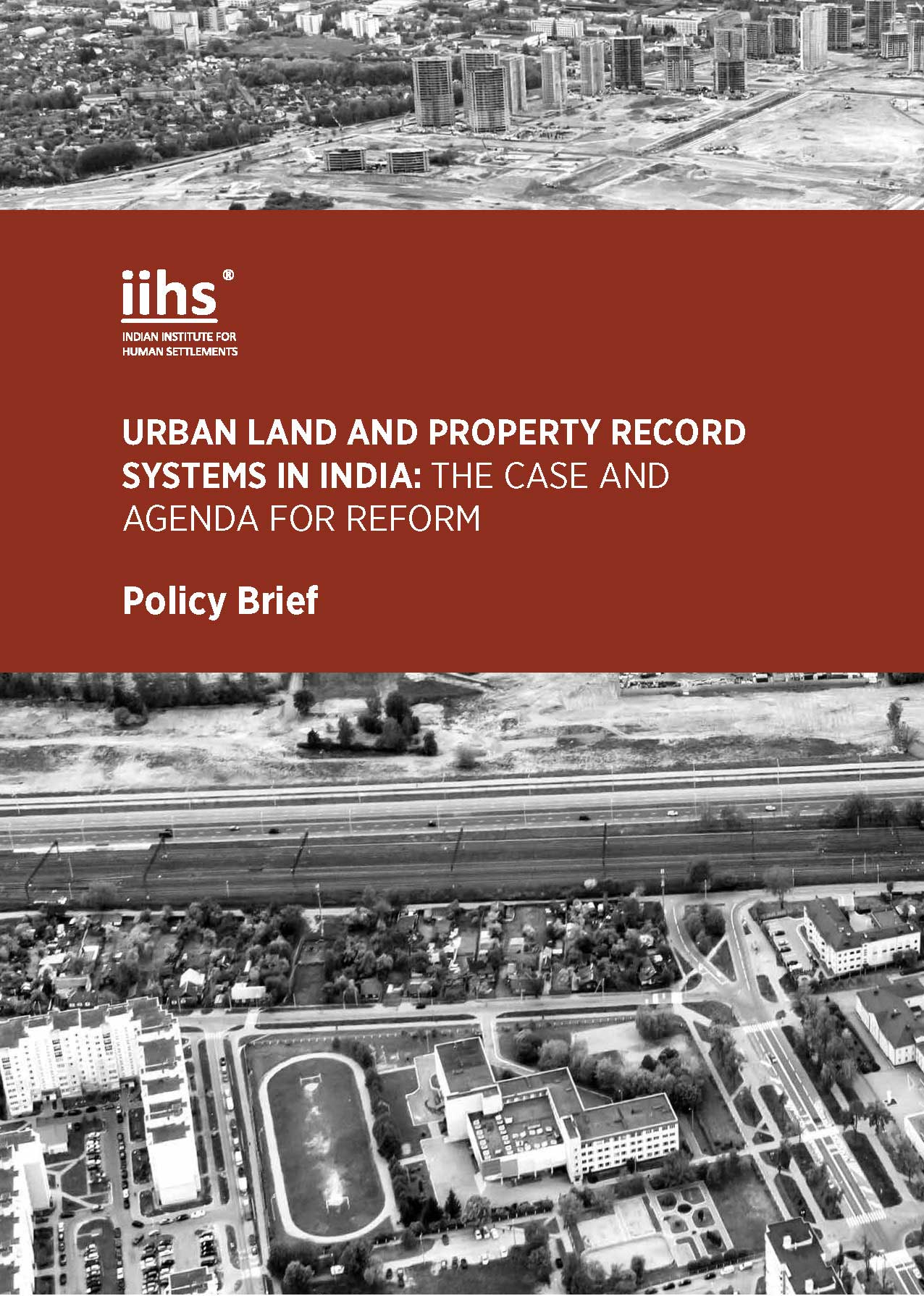 Urban Land and Property Systems in India: The Case and Agenda for Reform
Urban Land and Property Systems in India: The Case and Agenda for Reform
This policy brief draws attention to the current status of land and property information system in Indian cities, and core gaps therein. It dwells on the case for reforming the country’s urban land and property record systems and proposes a way forward.
 The State of Real Estate Regulation in India 2023
The State of Real Estate Regulation in India 2023
This report draws on data available in the public domain from 18 RERAs and their websites to take stock of the progress made in last seven years in relation to the remit of RERA activity, the extent and timeliness of project disclosures, arrangements for grievance redress and institutional functioning of real estate regulatory authorities.
 Urban Employment Programmes
Urban Employment Programmes
This policy brief examines urban employment programmes (UEPs) in India offering insights into three models of UEPs currently prevalent in India, including the scope and design of these programmes, the nature of permitted works, and delivery mechanisms. It suggests changes and modifications towards the design and operationalisation of UEPs so that they can also be leveraged to take on broader questions of urban inequalities.
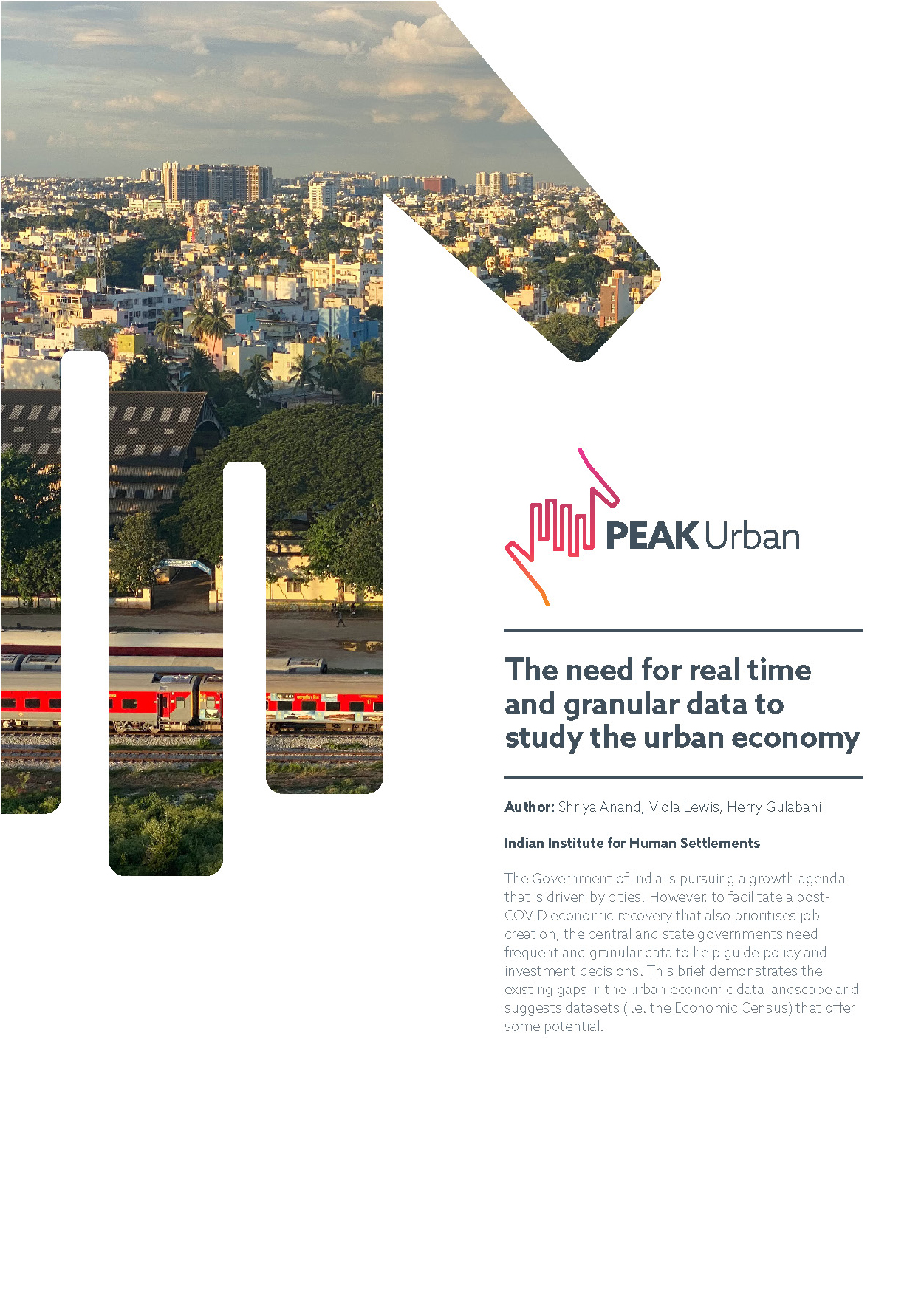 The Need for Real Time and Granular Data to Study the Urban Economy
The Need for Real Time and Granular Data to Study the Urban Economy
The policy brief argues that the recent economic growth agenda driven by cities is severely constrained by gaps in the ways by which data is collected and released, and the level of spatial granularity available. While some datasets offer some potential, it is important to address the gaps in order to more effectively make economic and urban plans, as well as prioritise areas for infrastructure investments.
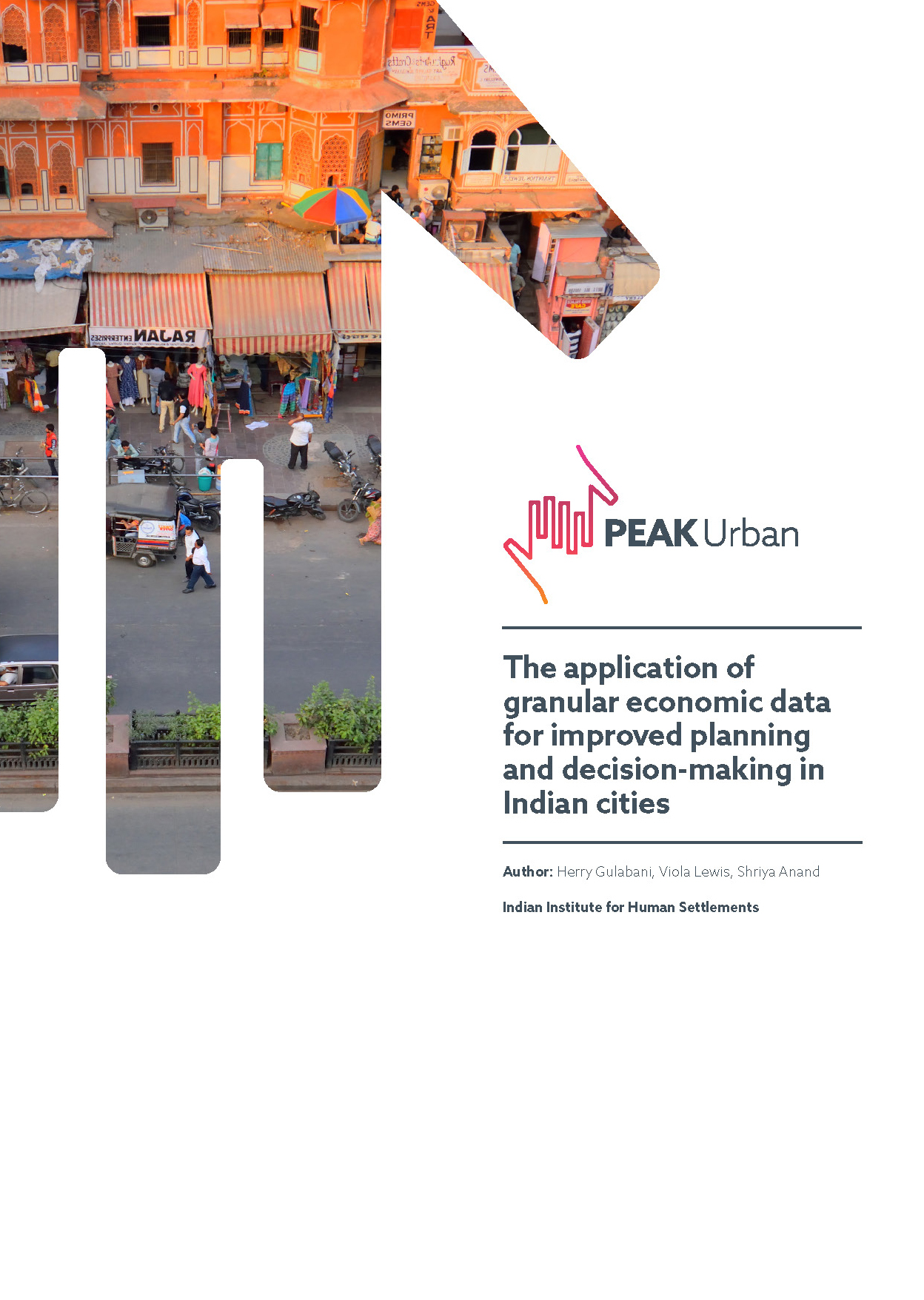
The Application of Granular Economic Data for Improved Planning and Decision-making in Indian Cities
To address the need for granular data on urban economies, IIHS’ research has compiled such a dataset for the Indian city of Bangalore, covering formal and informal firms across different kinds of economic activities at a high level of spatial granularity. In this brief, we present applications of this newly constructed dataset for understanding Bangalore’s urban economy, and make a case for how this can play an important role to support better economic and urban planning for Indian cities.












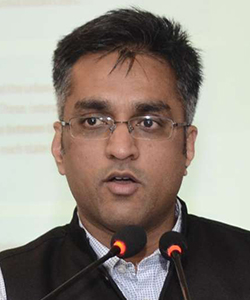



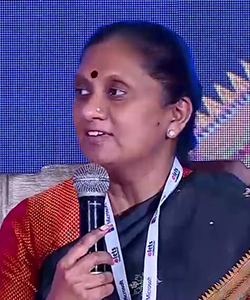


SESSION TITLE: IMPROVING URBAN GOVERNANCE – ELECTED REPRESENTATIVES/ CHANGE AGENTS- PERSPECTIVES AND POSSIBILITIES
29 November 2023 | 11.30 am – 1.00 pm
Moderator: Amlanjyoti Goswami, Chief- Legal and Regulation, IIHS
Elected representatives, by virtue of the Constitutional legitimacy and popular support they enjoy, can play a pivotal role in realising the country’s ambitious growth and development goals. They can embrace and mobilise momentum around transformative change agendas, influence enlightened laws, policy stances, and institutional practices, and ensure effective representation of the interests of their constituents, particularly the poor and vulnerable.
However, this potential is not fully realised in the context of Indian cities. Elected municipal representatives remain hemmed in on account of an incomplete devolution process that has constrained urban local bodies (ULBs) from emerging as an empowered third tier of government.
This, together with limited attention to building elected municipal representatives’ perspectives and capacities for engaging with emerging opportunities and challenges, effectively vests city-making powers and responsibilities with other tiers of government, disbalances the relationship between the political and administrative wings within municipalities, and makes it difficult for elected representatives to effectively respond to local concerns. At another level, electoral reforms are needed to stimulate wider participation in electoral processes.
In this backdrop, the session reflected on the following questions:
- What lessons can we draw from the journey of elected municipal representatives who have been able to negotiate prevalent challenges to make meaningful contributions to improving their cities? In particular, what was the set of enabling conditions and stakeholder position alignments that allowed them to achieve improvements despite known gaps in devolution?
- What are the factors currently constraining elected municipal representatives from fulfilling their potential and emerging as effective champions for their cities and their constituents? What measures – including but not confined to legal changes – can be initiated unlock these constraints, and where are the principal challenges anticipated?
- How can interests of elected representatives in various tiers of government and parastatal and city agencies be aligned to ensure a coherent agenda for, and collaborative approach to, urban transformation? How can knowledge institutions and civil society contribute to this?
SESSION TITLE: REIMAGINING INFRASTRUCTURE AS A SERVICE
29 November 2023 | 2.00 pm – 3.30 pm
Moderator: Mahima Vijendra, Senior Consultant – Practice, IIHS
Urban India has witnessed significant infrastructure investment in the last couple of decades. However, familiar images of flooded streets and homes, overcrowded public transport and hospitals, unsanitary surroundings, choked water bodies, water tankers, open defecation around rail tracks, etc., and a growing market for water and air purifiers, bottled water, inverters, and generators, suggests that these investments have not always translated into service quality and quality of life improvements.
The alienation and devastation of many ‘commons’ and the disproportionate brunt of the service gap that the poor and vulnerable face are two particularly challenging aspects of the situation. With infrastructure investment momentum likely to be sustained in the coming years and climate challenges looming, this is an important juncture to reflect on the delicate investment-outcome link, whether service access and quality need to be foregrounded and infrastructure needs to be imagined and delivered differently.
In this backdrop, the session reflected on the following questions:
- What explains the present disconnect between increased infrastructure investment and relatively modest quality of life improvements? Has the accent on infrastructure creation distracted us from more complex issues of service delivery and what are the anticipated opportunities for and challenges in course correction?
- How can public, private and informal roles be better aligned to ensure quality of life improvements, particularly for the poor and the vulnerable and smaller urban centers? What would this mean for the way we approach service delivery, and infrastructure aligned to improved services?
- Mounting climate and disaster risks have led to a focus on disaster resilient infrastructure, but how do we ensure that service delivery systems are resilient and forward-looking and ensure that the full potential of infrastructure investments are realised?
SESSION TITLE: URBAN FINANCE: FINDING THE MONEY, DIRECTING IT RIGHT
30 November 2023 | 10.00 am – 11.30 am
Moderator: Manish Dubey, Chief- Practice, IIHS
Increased inter-governmental transfers and spends under national flagship missions and state programmes have ensured sizable investment in urban India in recent years. However, this investment remains incommensurate with requirements. Current investment, largely powered by public financing, may be just about a fourth or fifth of what is needed.
Amidst known challenges in public financing, there has been a revival of interest in mobilising private investment, particularly via municipal bonds. A case is also being made for exploring blended financing, with a view to comforting private capital with better risk distribution and return profiles.
Efforts in these directions, however, are likely to remain constrained till a range of regulatory issues are addressed and cities become credit-worthy and offer robust project pipelines. Importantly, there are chances of investments getting directed away from smaller cities, poor and vulnerable sections of the population, and sustainable and resilient infrastructures as risk-return profiles acquire increased salience in investment decisions.
The present moment – with the impending announcement of 16th Finance Commission, municipal bond issues finding increasing favour, and conversations around blended financing gathering momentum – is an opportune one to reflect on the policy stances that will fundamentally strengthen city finances, allow cities to mobilise private investment, and ensure inclusive and sustainable investments.
In this backdrop, the session reflected on the following questions:
- How do policy makers, city administrators, financial regulators, financial intermediaries, and philanthropies view the investment opportunity Indian cities present? What are the challenges they anticipate/ experience, and how are they navigating these presently?
- Even as municipal bonds and blended financing are increasingly being explored, what are the policy and regulatory stances and practices that need to be introduced for the mobilisation possibilities of these instruments to be optimally realised in the interests of inclusion and sustainability?
- What are the critical measures the 16th Finance Commission must consider for strengthening city finances, preparing cities to draw private investments, and ensuring that investments are steered to serve poor and vulnerable populations, smaller towns, and sustainability goals?
SESSION TITLE: THE CONTOURS OF A CITIZEN-CENTRIC LAND GOVERNANCE REGIME
30 November 2023 | 1.00 pm -2.30 pm
Moderator: Deepika Jha, Senior Consultant, Practice, IIHS
While rural India has witnessed much progress in streamlining land records, with associated benefits of ease of living, easier access to property documents, and faster processes of registration, Indian cities have lagged.
Urban land information systems in the country are not always comprehensive and reliable and struggle to recognise continuous changes in land use and built form. This, in turn, impacts citizen’s ease of living, economic opportunities, urban planning, infrastructure development cycles, and municipal finances. The key challenge arises from the fragmentation of land governance responsibilities and land-related information among multiple actors, both public and private.
The rural experience, notwithstanding issues around data updating and streamlining of business processes, offers lessons in terms of achieving institutional coordination (though the urban landscape has a wider array of actors involved) and points to the possibilities of leveraging technology for streamlining land information systems. Overall, data transparency and accessibility, coupled with legal and regulatory reforms in land governance, are likely to determine the contours of a future urban land information regime.
In this backdrop, the session reflected on the following questions:
- What are the principal challenges in streamlining urban land record systems, how are Indian states/ cities addressing these, what lessons do their experiences offer, and what more needs to be done to realise a comprehensive, reliable, and user-friendly urban land information system?
- What opportunity do housing and infrastructure financing institutions and technology service providers see in efforts to reform urban land information systems, what is their current experience of engaging with the subject, and how can they contribute to efforts in this direction going forward?
- What is the set of policy, legal, and programmatic measures that need to be contemplated to ensure improved urban land information systems, including safeguards to ensure equity? How can these be incentivised for wider adoption by Indian states and cities?
SESSION: INNOVATION AND THE GREEN CITY
30 November 2023 | 11.45 am – 1.00 pm
Moderator: Amir Bazaz, Senior Lead- Practice, Associate Dean – IIHS School of Systems and Infrastructure and IIHS School of Environment and Sustainability
Climate induced challenges, rapid and haphazard urbanisation, incidental environmental degradation, and biodiversity losses are impacting multiple dimensions of the Indian urban landscape and constraining the country’s urban and overall growth and development prospects.
Efforts towards decarbonisation and adapting to climate and disaster risks present an opportunity to transform Indian cities. This requires enlightened policy and regulatory stances and coordination at multiple levels of governance, and, equally, innovation and imaginatively reworked business models, processes, and practices in the private sector.
The private sector is already playing an active role in shaping sustainable cities and addressing decarbonisation and adaptation agendas. Driven by enterprise and innovation, it’s engagement in the sustainability space straddles the arenas of built environment, mobility solutions, nature-focused and nature-based interventions, capacity building for communities at risk, and climate-aligned and climate-responsive infrastructure development.
However, the magnitude of the challenge at hand warrants attention to actions needed to further strengthen the innovation eco-system in a manner that reinforces the positive nexus between innovation and the green city.
In this backdrop, the session reflected on the following questions:
- How is India’s private sector viewing and responding to the sustainability challenge in Indian cities? What are the business opportunities it sees in the present context, and what strategies is it contemplating to harvest these opportunities?
- What are the key factors abetting and/ or constraining a meaningful private sector response to urban India’s sustainability challenges? What role has the often-talked-about orientation towards frugal innovation played in such responses?
- What is the set of policy and operational measures that is likely to strengthen the present innovation eco-system and, at a larger level, the sustainability agenda for businesses? What role is envisaged for financial institutions, academic and research institutions, and civil society in such strengthening?
